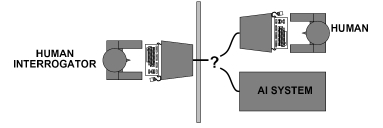



Think like humans "cognitive science" Ex. GPS |
Think rationally => formalize inference process "laws of thought" |
Act like humans Ex. ELIZA Turing Test |
Act rationally "satisficing" methods |
ELIZA: A program that simulated a psychotherapist interacting with a patient and successfully passed the Turing Test. Some extracts from the test:
Patient: Men are all alike. ELIZA: In what way? Patient They're always bugging us about something or other. ELIZA: Can you think of a specific example? Patient: Well, my boyfriend made me come here. ELIZA: Your boyfriend made you come here? Patient: He says I'm depressed much of the time. ELIZA: I am sorry you are depressed. ...
Problems: ELIZA and other similar programs stressed simple syntactic analysis and generation of sentences. They used pattern matching with known sentences. They used pattern matching with known vocabulary and key words with templates of sentences to generate. For example,
if sentence = "* mother *" then respond with "Tell me about your family."
Note that even with simple syntactic style, ELIZA managed to fool people. Purely behavioral-based approach can be simulated without a deeper understanding or true "intelligence."
Alan Turing wrote a seminal paper in 1950: “Computing machinery and intelligence”. He addressed the questions: "Can machines think?" and "Can machines behave intelligently?".
He developed an operational test for intelligent behavior: the Imitation Game, and predicted that by 2000, a computer would have a 30% chance of fooling a lay person for 5 minutes.

He anticipated all the major arguments against AI in the following 50 years, and suggested the major components of AI: knowledge, reasoning, language understanding, and learning.
So he laid the foundation of AI. But there is a problem: the Turing test is not reproducible or amenable to mathematical analysis.